- Home
- Stephen Hunt
Jack Cloudie j-5
Jack Cloudie j-5 Read online
Jack Cloudie
( Jackelian - 5 )
Stephen Hunt
Stephen Hunt
Jack Cloudie
If you can smell the scent of death on the air and you do not know where the smell is coming from, then the smell is coming from you.
Ancient Cassarabian proverb
CHAPTER ONE
Middlesteel, the Kingdom of Jackals’ capital city
Jack Keats was pushed aside by the others in the gang as the shout echoed out from the shaft in the wall. They were deep in the bowels of Lords Bank, having broken in through the sewers. But even so, if the boy kept yelling like that, one of the bank’s night watchmen would hear the racket and then every member of the young gang would be done for.
‘I told you it was a mistake bringing the boy,’ said Jack. ‘He’s too young.’
‘Shut your cake-hole,’ snarled Boyd. It was hard to tell whether the gang’s leader was snapping at Jack for questioning his authority, or venting his aggression towards the boy crawling deep into the shaft running alongside Lords Bank’s main vault. Boyd leant into the dark shaft, looking in vain for any sign of the small boy’s flickering gas lantern.
‘He’s scared down there,’ said Jack. And of course, my fingers aren’t trembling from fear. That’s just the cold.
‘He should be more scared of me,’ spat Boyd, bunching his fist in anger before turning on Jack. ‘Yeah, and you’ve got two brothers his age locked up in the sponging house. And that’s where they’ll stay unless we get inside this vault. So you think of your kin, not ’im down there.’
‘The workhouse,’ said Jack. You ignorant fathead. ‘They’re in the workhouse now, not the debtors’ prison.’
The five others standing behind the gang chief sniggered at the distinction and Jack’s superior tone of voice, all of them grimy and dust-covered from breaking through the brick foundations of the sewer to get this far. Maggie was with them and she gave him a despairing look — the kind that said this was not a good time to be wearing his education on his sleeve. She had shown him the ropes of street life in more ways than one. Eating stone-hard bread in a debtors’ prison and broken by the family debts, or washing down the same rations with the gravy water that passed for soup in the workhouse. Any difference between the two was paper-thin, and Maggie knew it.
‘Well, pardon me,’ laughed Boyd. ‘You’re not the son of a gentleman farmer down ’ere. You’re shit, just like us. On the job, on the make.’ Boyd pointed down the shaft towards the young boy. ‘He’s small, useful shit. You’re clever shit, and I need your fingers, so don’t give me no excuse to break some of ’em for you.’
Jack guessed this wasn’t the time to point out the meaning of a double negative to the hulking thug. ‘And what about you, Boyd?’
‘I’m the biggest shit of ’em all, Cracker Jack. I dream up the juicy jobs; I saw how your clever fingers might drag us all out of the gutter. After we pull off this job we’ll dress like swells and eat like lords from the best the city’s got to offer.’
Jack stared into the dark shaft where the boy was coughing. But only if their little shaft rat found the vault’s timing mechanism and managed to jam it, only if he held his nerve and kept the special tool Jack had forged wedged into the machinery for long enough. And only if Jack was every bit as good as he believed himself to be.
‘Talk to the runt,’ Boyd ordered Maggie. ‘Steady his nerves.’
Maggie moved to the hole and started whispering and cajoling. She was as much a mother as most of the young street children and pickpockets in the slums behind Sungate had known, although she was barely an adult herself. Her pleas and support must have had the desired effect, though, because Jack heard the cogs of the transaction-engine lock they had just exposed snap into place. It had shifted from its nighttime lockdown mode to its daytime setting, and that meant the vault could now be opened. Provided you bore the two golden punch cards of the chief cashier and chief clerk of Lords Bank, inserted in unison. Or, failing that, if you possessed a talent for opening such things.
The others in the group watched in quiet reverence as Jack dipped inside the toolbox he had lugged through the dark, stinking sewers, and began picking away at the exposed mechanism of the vault’s steam-driven thinking machine, taking readings from the symbols along the bank of slowly rotating drums. It took twenty anxious minutes to re-jig the punch-card reader to accept his input, but the physical work was in many ways the simplest part of this crime — pure mechanics, that any engineman skilled enough could undertake. But the next part of the job was one only the most talented cardsharp would be able to carry off. Jack would have to match his brain against the thick layers of cipher and code that lay between him and a series of steel bolts as large as his legs, persuading them to withdraw and admit the gang into the vault … into a whole new existence. Let me be good enough. Sweet Circle, let me get this one thing right. Just for today, let me be good enough.
‘That’s it, boy,’ muttered Boyd behind Jack, in what the ruffian probably mistook for encouragement rather than distraction. ‘You do this and you’ll be able to buy your two runts out of the poorhouse. You’ll be able to complete your training with the Brotherhood of Enginemen — hell, you could buy a seat on the guild’s council.’
Jack grimaced at the delinquent’s meagre conception of his life before his father’s debts had seen his family incarcerated. What comfort, to be appreciated by you, you simple-minded thug, but nobody else. This is what I’ve sunk to. Jack didn’t need to finish his guild training; he had already moved far beyond that. What he needed now was to buy his way into sitting the examinations and pay for his apprenticeship papers. Without that, no mill owner or dusty office of clerks was going to allow him within a thousand yards of any engineman’s position. A closed shop, like so many of the skilled trades.
‘Quiet,’ hissed Jack.
‘I’ve seen you do this a dozen times.’
‘Not like this.’ He brushed his dark hair out of his eyes. ‘This isn’t a lock on a jeweller’s shop or some merchant’s townhouse. This is a strong cipher, written by people who knew what they were doing. Proper cardsharps.’
Yes, the sort who were only too glad to turn him away from every job he had begged for, a ragamuffin without guild papers. Unwanted competition.
‘Please, Jack.’ Maggie’s voice sounded from next to the shaft. ‘Quickly. I can hear little Tozer down there. He’s crying.’
‘Button it up, runt,’ Boyd hissed down the shaft. ‘You keep your hand stuck in the timer as long as we need it there.’
Boyd could smell the money now, he could taste it. And the Circle knew, Jack had seen Boyd like this before. His shoulders started rolling from side to side, as if he was balancing the weight of all the mouths that needed feeding among his little mob. Boyd was always dangerous during such times. Pity the maid-of-all-works who stumbled across him rifling through her mistress’s cabinet when he had a necklace in one hand and a blade in the other.
Jack turned his attention back to the transaction engine, his clever fingers going about their work. Whatever puppy fat there had been on those fingers had disappeared years ago. He was bony now. Thin and desperate. There wasn’t a mirror in the derelict rookery apartment that Jack and the others called home, but he knew what he would see if he looked in one now. Street eyes. The trusting innocence of youth replaced by the narrow, darting glance of the slums. Old man’s eyes in a face too young for them. They were the same eyes he looked into when he saw his two brothers during the weekly visiting hour at the workhouse. Poor little Alan and Saul. Half his age, but they already had those eyes. Unless Jack could steal a different life for them. Buy time enough to forget the images of their father coughing his last breath away inside the d
amp confines of the sponging house. Am I any better than father was? I thought that after his death saw our family discharged from the debtors’ prison, I would be able to get a job — begin a new life, a new start. How little did I know. It was my failure that saw my brothers end up in the workhouse, my mistakes, not father’s. Trading the sponging house for the poorhouse, one low class of prison for another.
Jack had the measure of the cipher now: he held it in his mind, still twisting and turning on the engine’s drums, as he removed the little portable punch-card writer from his sack. He began to stitch a series of holes in the first of the blank punch cards that had been stolen to order for him. No one else could keep their decryption routines so short, not an ounce of wasted code. Jack’s key was done within five cards. Feeding them into the exposed injection reader, he heard ten seconds of clanking and clunking in answer from the depths of the engine, and then the massive vault door slowly began to inch upwards, revealing the first glimpse of what lay within. A chamber as big as a Circlist church hall, steel walls marked with thousands of deposit-box drawers and a metal floor crisscrossed by waist-high bins filled with notes and coin of the realm. Lords Bank was the richest counting house in the country, patronized by the wealthiest industrialists, merchants and landowners in the Kingdom, and here their wealth stood revealed, inch by slow inch; until the door stopped opening, squealing rollers matched by a scream from the shaft.
Jack’s eyes darted to the drum’s new configuration, the icons of symbolic logic lining up in a fierce new pattern. ‘The vault’s shifted back to nighttime mode.’
‘You little runt!’ Boyd yelled down the shaft.
‘I dropped the tool out of the timer,’ the boy’s trembling voice came back, ‘just for a second, that’s all.’
There was the distant sound of alarms on the many floors above them, the guards and watchmen no doubt rousing as the late-night peace of their marble temple to money was rudely shattered.
Boyd smashed his fist in fury against the stalled vault door, a thin strip of the paradise snatched away from him still teasingly visible. ‘My fortune. My bleeding fortune.’
One of the young thugs dragged the gang’s leader back, pointing up at iron tubes pushing out of the ceiling. ‘Dirt gas. Got to go!’
‘Tozer,’ Maggie yelled into the black square of the shaft entrance. ‘We have to pull him out.’
Boyd shook his head, roughly shoving the rest of the gang back in the direction of the bank’s breeched wall and the sewer tunnels.
‘He’ll suffocate down there before he climbs out,’ said Jack.
Boyd seized Maggie’s arm and pulled her away from the shaft. ‘You stay then, Cracker Jack. See if you’re clever enough to breathe dirt gas.’
Jack’s head turned, hearing both the whimper of the six-year-old thief and the distant gurgle of liquid gas passing down the pipes above him, already reacting with the air and turning into sweet, deadly, choking smoke.
No time. He’s as good as dead down there. I’ve failed him too, just like I always do my family.
‘Never was any good lifting wallets either,’ said Boyd, nodding in satisfaction as he saw that Jack had decided to cut and run like the rest of them. Clever hands like Jack’s were hard to find in the slums.
Jack tried to ignore the echoing screams that followed him out into the sewers. Coward, I’m a useless coward.
The agonizing sound finally died as the gang turned into the light from the constabulary’s bull’s-eye lanterns. Then the shouts of uniformed brutes wielding police cutlasses and heavy pistols charging down the sewer tunnel were all that the hungry young thief could hear.
CHAPTER TWO
The Empire of Cassarabia — Haffa Township
There was only one upside to being a slave, Omar considered, from his vantage point on top of the desalination tank. Why, if he had been born a freeman like Alim, he too might be wearing a perpetual frown of worry across his face all the time. Freemen in Cassarabia always had something to worry about, it seemed. Politics. Religion. Trade. The weather. Alim was probably worrying why the salt-fish in the tank below Omar weren’t being released into the next tank down the line, ready to go about their profitable business of separating the salt out of the sea water, leaving pure clean drinking water behind them, before disgorging pellets of table salt onto the beds of the third tank lined up under the shade of the water farm.
But nobody expected initiative from a slave. Indeed, it was very carefully beaten out of them. Omar had been ordered to scrape the salt residue out of one of the drained tanks, readying it for a new batch of salt-fish. Omar hadn’t been instructed to then open the lock gates and set the desalination process in motion again. A freeman would care about having fresh drinking water to sell at market. A freeman could have their wages docked. But a slave? Slaves weren’t encouraged to show their initiative, for such an attitude led to escape attempts across the desert.
‘Omar Ibn Barir,’ shouted Alim, spotting the young man lazing on top of the water tanks. ‘Do you expect the water farm to run itself?’
Well, miracles do happen, master. But failing that, how about you just shout at me until I do it for you?
Omar pushed himself up and off the water tank. He could always tell when Alim was annoyed with him, because he used his full name. The ibn to indicate he was property, and the house-line of Barir to indicate where all his devotion should rightly be directed. ‘I was resting, Master Alim. Saving my strength for my next duty.’ He indicated the parallel run of desalination tanks in front of them. ‘Have you ever seen the bottom of a filter tank scrubbed so clean of salt? There are chefs in the souks of Bladetenbul who will say twenty prayers of thanks to the one true god that there was a boy called Omar so diligent that the sacks of salt they buy from us are as plump as a caravan master’s belly.’
‘It is you who should say twenty prayers,’ said Alim, ‘for being so fortunate as to be born a slave into the house of Marid Barir, for no other master would spare you the floggings you so richly deserve.’
Omar did not risk the old man’s ire by noting that few other civilized masters would have employed a grizzled freeman like Alim, either, his rough nomad manners barely softened by the decade he had spent inside the town of Haffa. Bred a slave, Omar counted the russet-faced Alim as much a father as he had known in his young life. The only male company he was familiar with, the only man he had worked alongside for years. Such as it could be divined, the good opinion of Alim mattered to Omar. Often he was gruff, but when the old nomad could be roused to humour, his laugh would explode like a thunderstorm, his body shaking and jolting almost uncontrollably under the shade of the water farm. Omar had noticed the old tribesman seemed to find less to laugh about these days.
Alim looked up at the tank where Omar had been lounging. ‘A fine view of the caravan road.’
‘There is no sign of the water traders yet,’ said Omar.
‘It is not water traders, I think, that you were looking for.’
Omar tried not to blush, affecting an air of nonchalance, as if he had no idea what Alim was inferring.
‘Shadisa will not come by today,’ said the old nomad. ‘She has gone down to the docks to inspect the fishermen’s afternoon catch for the great master’s table.’
Omar shrugged, as though the news made no difference to him.
‘Ah, Omar,’ sighed Alim. ‘If you were a comely female and she the son of a freeman, rather than a daughter, you might have a chance. But what fortune or alliance does a male slave bring to an honourable family? The stench of salt-fish and the fifty altun it would cost to purchase your papers of ownership from Marid Barir?’
‘My smell is not so bad.’ And I am born for more than this, you grumpy old goat. I can feel my greatness like the burning fingers of the sun, trembling and ablaze within me. A pity you do not see it.
‘You have worked here so long that you have lost your sense of it,’ said Alim.
‘Whatever my smell, Alim, you cannot fail to admit
that I am handsome. When I catch my reflection sometimes, I believe that the one true god must have sent an angel from heaven to bless my cradle.’
‘He sent something, boy. A lazy joker to swell my workload here.’
In one matter the old nomad was correct, Shadisa would not come by today. Omar knew. There had always been a connection between the two of them. He could sense when she was coming or when she was near. Sometimes when he was in the great house of their master, he would imagine she was in a certain part of the house and if he ventured close to there, he would find that his sixth sense was proved correct. Old Alim had laughed when Omar told him about this ability. There were men whose bodies had been twisted by womb mages who had such abilities, the nomad had explained, scouts in the elite regiments of the caliph’s army — units such as the imperial guardsmen — the cutting edge of the caliph’s scimitar. They hunted by smell, or perhaps the unseen magnetic patterns of the mind’s thoughts. A mere slave boy had no such illustrious heritage, Alim had laughed. Just the unrequited longings of what he would never have.
But Omar knew better. He only had to meet someone once, take note of them, and then he could then feel their presence if they were near enough. It was as if an invisible thread connected him to them, a tingling warmth he could feel in the depth of his being. Alim was the only one he trusted enough to tell of his gift. It really was not a wise thing for slaves to reveal such abilities, less they be judged a threat and culled. Wild blood, the same as the nomads who haunted the dunes. Too many changes by womb mages and the witches of the desert, percolating through undocumented bloodlines. Who knew what changes had been wrought in the past, what gifts were hiding in his flesh? He hadn’t even spoken to Shadisa about this matter.
Ah, Shadisa. Omar still recalled the first time he had noticed Shadisa. She had been a young helper in the kitchens of the great house, her bare elbow balanced on one of the tables as she challenged the other children on the staff to arm-wrestle her. Barely nine himself, he had taken up the challenge and asked Shadisa what she would give him if she lost. ‘A kiss,’ she had brazenly answered. One Omar had sadly never claimed, for her long perfect arms had proved disconcertingly muscular, and he had lost to her in seconds.

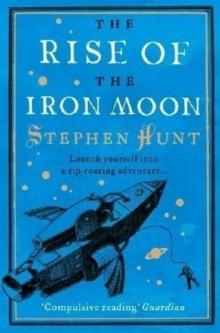 The Rise of the Iron Moon
The Rise of the Iron Moon Empty Between the Stars (The Songs of Old Sol Book 1)
Empty Between the Stars (The Songs of Old Sol Book 1) From the Deep of the Dark
From the Deep of the Dark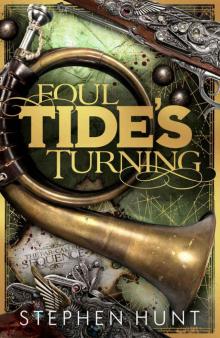 Foul Tide's Turning
Foul Tide's Turning Transference Station
Transference Station Secrets of the Fire Sea j-4
Secrets of the Fire Sea j-4 Void All The Way Down: The Sliding Void Omnibus
Void All The Way Down: The Sliding Void Omnibus The Kingdom Beyond the Waves j-2
The Kingdom Beyond the Waves j-2 From the Deep of the Dark j-6
From the Deep of the Dark j-6 The Court of the Air
The Court of the Air The Court of the Air j-1
The Court of the Air j-1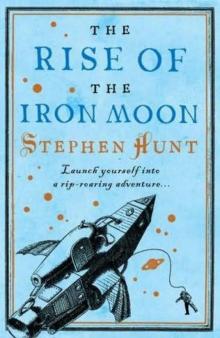 The rise of the Iron Moon j-3
The rise of the Iron Moon j-3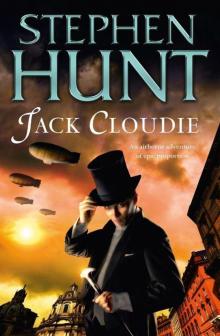 Jack Cloudie j-5
Jack Cloudie j-5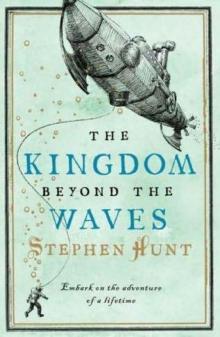 The Kingdom Beyond the Waves
The Kingdom Beyond the Waves The Stealers' War
The Stealers' War In Dark Service
In Dark Service